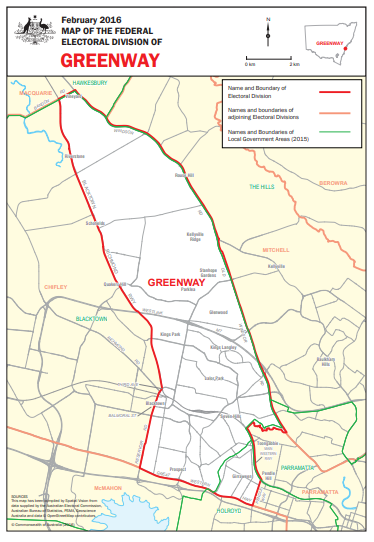|
|
|
|
| Adam Carr's Election Archive
|
Australian federal election, 2022
Division of Greenway, New South Wales
Named for: Francis Greenway (1777-1837), emancipist architect
North-western Sydney: Blacktown, Girraween, Glenwood, Lalor Park, Stanhope Gardens
State seats: Parts of
Blacktown,
Prospect,
Riverstone and
Seven Hills
Local government areas: Parts of
Blacktown and
Cumberland
Borders with:
Chifley,
McMahon,
Macquarie,
Mitchell and
Parramatta
Enrolment at 2019 election: 110,343
Enrolment at 2022 election: 119,941 (+08.7)
1999 republic referendum: No 55.0
2018 same-sex marriage survey: No 53.6
Sitting member: Michelle Rowland (Labor):
Elected 2010, 2013, 2016, 2019
2007 Liberal majority over Labor: 4.5%
2010 Labor majority over Liberal: 0.9%
2013 Labor majority over Liberal: 3.0%
2016 Labor majority over Liberal: 6.3%
2019 Labor majority over Liberal: 2.8%
Liberal two-party vote 1983-2019
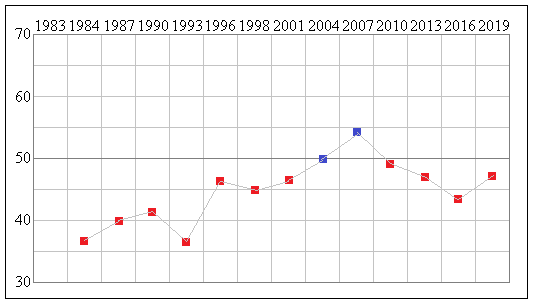
Status: Very marginal Labor
Best Labor booths, two-party vote: Blacktown North (68.2), Glenwood West (66.0),
Seven Hills Central (64.8), Seven Hills West (62.5), Seven Hills (62.4)
Best Liberal booths, two-party vote: Vineyard East (63.7), Baulkham Hills PPVC (61.1), Kings Langley North (60.0),
Schofields South (58.0), Riverstone East (56.4)
2019 results
Statistics and history
Candidates in ballot-paper order:
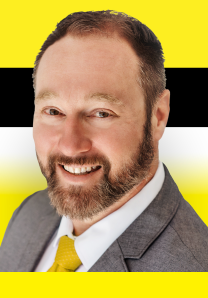 |
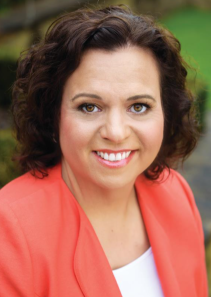 |
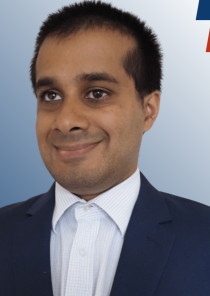 |
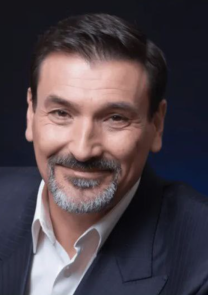 |
1. Mark Rex
United Australia Party |
2. Michelle Rowland
Australian Labor Party |
3. Adam Kachwalla
Liberal Democrats |
4. Ricardo Bosi
Independent |
 |
 |
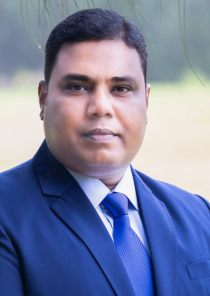 |
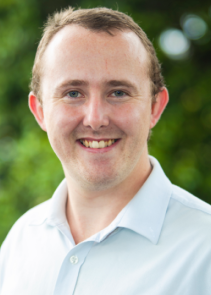 |
5. Love Nanda
Independent |
6. Rick Turner
Pauline Hanson's One Nation |
7. Pradeep Pathi
Liberal Party |
8. Damien Atkins
Australian Greens |
Candidate websites:
Damien Atkins
Adam Kachwalla
Pradeep Pathi
Mark Rex
Michelle Rowland
Division of Greenway
Greenway was created in 1984, and on its original boundaries it was based on the Labor stronghold of
Blacktown, which made it a fairly safe Labor seat. On its current boundaries Greenway has a fairly high
level of median household income, and a high
proportion of households paying mortgages, making it a high-income mortgage belt seat. It has one of
the highest level of families with dependent children of any seat. It also has a high
level of non English-speaking households, and is notably becoming a centre of Indian immigration.
The rapid growth of new middle-class suburbs at the
western end of the seat in the 1990s weakened Labor's position. Labor neglected the seat, allowing old-style members
such as
Russ Gorman and
Frank Mossfield to represent it. In 2004 Labor's candidate was
Ed Husic, a Muslim
of Bosnian parentage. His candidature provoked an anonymous religious smear campaign which undoubtedly
cost Labor votes, and this, combined with the demographic erosion of Labor's position and the negative
impact of
Mark Latham's leadership, was enough to tip the seat to the Liberal candidate
Louise Markus.
The 2006 redistribution removed Blacktown from Greenway and extended the seat out into the affluent
Hawkesbury region, making it much safer for the Liberals. But the 2010 redistribution reversed this,
putting half of Blacktown back into the seat and turning it back into a Labor seat, though not as safe for
Labor as it once was. At the 2010 election Markus followed her Hawkesbury base into the seat of
Macquarie,
and Labor regained Greenway.
Michelle Rowland, Labor MP for Greenway since 2010, was a lawyer and director of the Western Sydney Area
Health Service before her election. She was also a Blacktown City Councillor. She held Greenway with
increased majorities in 2013 and 2016, but saw that partly reversed in 2019. She is now Shadow Minister for Communications. The
Liberal candidate is Pradeep Pathi, a finance manager with Westpac bank.
The Greens candidate is Damien Atkins, whose occupation is not stated.
Demographics:
Median weekly household income: $1,941 (Australia $1,438)
People over 65: 9.9% (Australia 15.8%)
Australian born: 54.5% (Australia 66.7%)
Ancestry: Indian 11.6%
Non-English-speaking households: 45.5% (Australia 22.2%)
Catholics 26.8% (Australia 22.6%)
Hindu 12.1%
No religion 15.4% (Australia 29.6%)
University graduates: 27.1% (Australia 22.0%)
Professional and managerial employment: 34.6% (Australia 35.2%)
Employed in manufacturing and construction: 22.2% (Australia 22.9%)
Paying a mortgage: 45.7% (Australia 34.5%)
Renting: 28.1% (Australia 30.9%)
Traditional families: 51.3% (Australia 32.8%)
Back to main page
|
|

